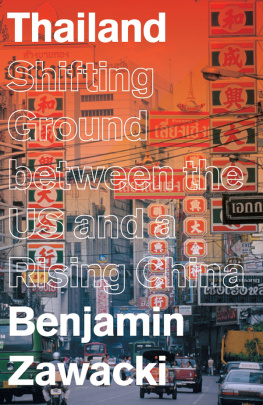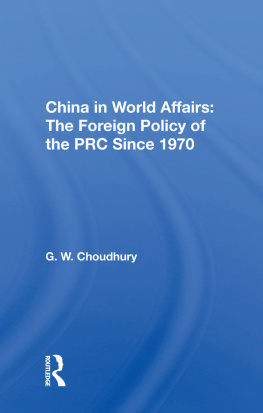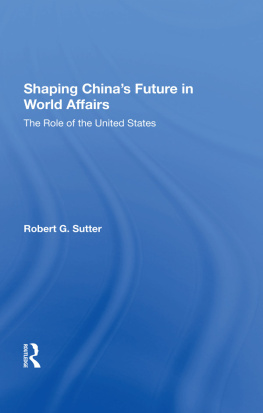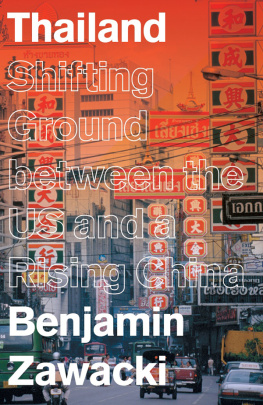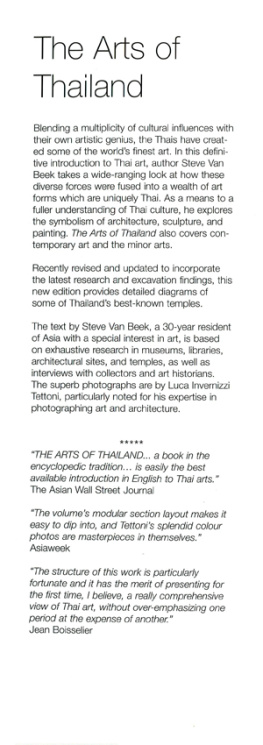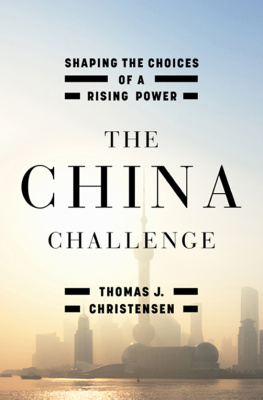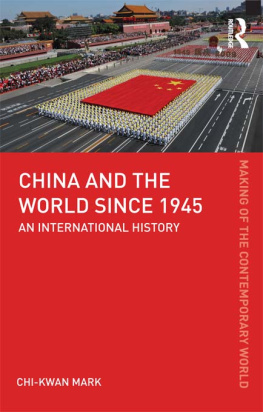
MORE PRAISE FOR THAILAND
An important book at a pivotal moment. Zawacki brings clear eyes and rigorous research to one of Americas most complicated and historically important Asian relationships.
Shawn W. Crispin, Southeast Asia Editor, Asia Times
Zawackis carefully documented and balanced analysis lifts the curtain on a gradual, often invisible, but seemingly inexorable geopolitical shift. It provides a thorough explanation of the circumstances that have led Thailand, once seen as an unequivocally staunch US ally, to lean increasingly toward a pragmatic and strategically assertive China.
Michael Herzfeld, Harvard University
Presents a powerful counter-argument to the conventional wisdom that Chinas economic rise alone explains Thailands pivot from the US to China. In thoroughly researched detail, the book traces a sorry trail of US condescension and clumsy diplomacy.
Daniel Fineman, author of A Special Relationship: The United States and Military Government in Thailand
Now comes the rare American deeply informed of a faraway country of whose people we know nothing, in a profoundly disturbing study of how the world-changing USChina dynamic unfolds in Thailand. Read and weep.
Jeffrey Race, author of War Comes to Long An: Revolutionary Conflict in a Vietnamese Province
ABOUT THE AUTHOR
Benjamin Zawacki was a visiting fellow in the Human Rights Program at Harvard Law School in 20142015, and a term member on the Council on Foreign Relations through 2016. He was Amnesty Internationals Southeast Asia researcher for five years, and served as a policy advisor to President Jimmy Carter and two other Elders in Myanmar. A regular contributor to the media in Southeast Asia, he has lived in Thailand for fifteen years. He holds degrees from the George Washington University Law School and the College of the Holy Cross.
ASIAN ARGUMENTS
Asian Arguments is a series of short books about Asia today. Aimed at the growing number of students and general readers who want to know more about the region, these books will highlight community involvement from the ground up in issues of the day usually discussed by authors in terms of top-down government policy. The aim is to better understand how ordinary Asian citizens are confronting problems such as the environment, democracy and their societies development, either with or without government support. The books are scholarly but engaged, substantive as well as topical and written by authors with direct experience of their subject matter.
Series editor: Paul French
Previous Titles:
North Korea by Paul French
Ghost Cities of China by Wade Shepard
Leftover Women: The Resurgence of Gender Inequality in China by Leta Hong Fincher
Chinas Urban Billion by Tom Miller
A Kingdom in Crisis: Thailands Struggle for Democracy in the Twenty-First Century by Andrew MacGregor Marshall
China and the New Maoists by Kerry Brown and Simone van Nieuwenhuizen
Myanmars Enemy Within: Buddhist Violence and the Making of a Muslim Other by Francis Wade
Forthcoming:
On the New Silk Road: Journeying through Chinas Artery of Power by Wade Shepard
Last Days of the Mighty Mekong by Brian Eyler
Hong Kong: Markets, Street Hawkers and the Fight against Gentrification by Maurizio Marinelli
Thailand
Shifting Ground
between the US and
a Rising China
Benjamin Zawacki

Thailand: Shifting Ground between the US and a Rising China was first published in 2017 by Zed Books Ltd, The Foundry, 17 Oval Way, London SE11 5RR, UK
www.zedbooks.net
Copyright Benjamin Zawacki 2017
The rights of Benjamin Zawacki to be identified as the author of this work have been asserted by him in accordance with the Copyright, Designs and Patents Act, 1988
Typeset in Garamond Pro by seagulls.net
Index: John Barker
Cover design: Keith Dodds
Cover photo Mark Henley/Panos
All rights reserved. No part of this publication may be reproduced, stored in a retrieval system or transmitted in any form or by any means, electronic, mechanical, photocopying or otherwise, without the prior permission of Zed Books Ltd.
A catalogue record for this book is available from the British Library.
ISBN 978-1-78360-870-6 hb
ISBN 978-1-78360-869-0 pb
ISBN 978-1-78360-871-3 pdf
ISBN 978-1-78360-872-0 epub
ISBN 978-1-78360-873-7 mobi
for Ella Nour and May Yasmine
Contents
I am an American. Having lived and worked in Southeast Asia since late 2002, I am an ex-pat only in a colloquial sense. I retain not only my US passport and citizenship, but an inherent if self-conscious American perspective as well. Reminded by the late historian Howard Zinn that you cant be neutral on a moving train, I forfeit any claim to neutrality in this book.
Two mitigating factors are at play. First, I am as much an ex-patriot as expatriate: someone who cares deeply about his country, but whose experience abroad has made him wary of nationalism. In just my years away, US foreign policy has not only fallen short of the values and ideals that supposedly inform and inspire it, but has given rise to another more negative set of standards. As costly as American policy in Thailand has been in just the 21st centurysince Thaksin Shinawatra took power in Bangkok and global terrorism struck Washingtonit does not compare to that in other regions. Deliberate and purposeful under Bush, halting and confused under Obama, US foreign policy has yielded few wins and a great many lossesnot least in the defense and advancement of human rights. This book traces one such policy failure whose causes and consequences resonate well beyond its particular theatre.
Second, I place little stock in the adage among ex-pats that If someone says he understands Thailand, he is misinformed. I do not claim to understand all of Thailand or to understand its more accessible aspects all of the time. It is a complex country. Yet to forfeit any claim to understanding on the basis of nationality is intellectually negligent and culturally orientalist. When for six months prior to a coup in 2014 millions of Thais called for replacing electoral democracy with selected leadership, one was to properly understand them as anti-democratic.
In 20022004 I represented Chinese asylum-seekers and assisted in their escape to Cambodia (after getting them into a Linkin Park concert). In 20062007 I wore UN blue in camps from which Thai authorities pushed refugees back to war and persecution in Myanmar. And as an Amnesty International researcher I interviewed torture victims in the deep south in 2008, documented Bangkoks violent confrontations in 2010, and sparred with Prime Minister Abhisit over Thailands lese majeste law. Twice in eight years I watched tanks roll into the capital and take over the kingdom.
There are more people associated with this book than I am able to thank. Thanks to friend and mentor Sam Zarifi, David Mathieson, and relentless journalist Shawn Crispin for their early support. Aticha Chaivichian was a brief but competent research assistant, while Greg Lowe provided valuable publication advice. I am grateful to Harvard University, whose law schools Human Rights Program hosted me as a Visiting Fellow in 20142015, and whose new Thai Studies Program provided context and relevance. Tyrell Haberkorn at Radcliffe provided welcome advice and encouragement. It is notable that until 1940 all American foreign policy advisors to Siam/Thailand were drawn from the law school, and that Thailands King Bhumibol was born nearby in 1927. Alongside Thailands two longest-serving foreign ministers, the king died during the course of this book in October 2016. And my deepest gratitude to Jeff and Chu Race, whose hospitality and friendship provided warmth amidst a superlatively cold Boston winter.
Next page
